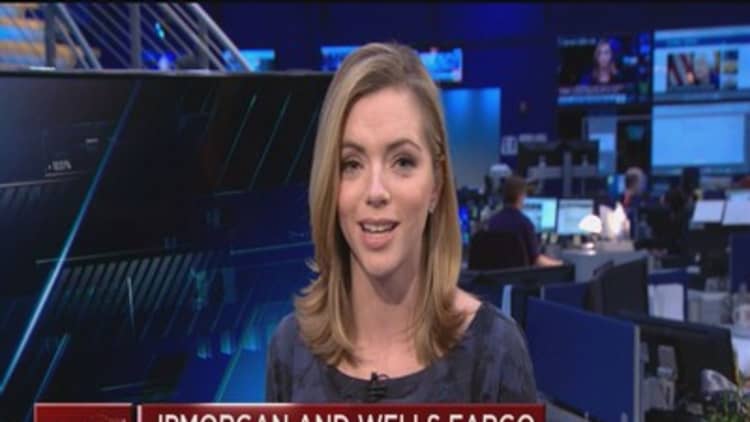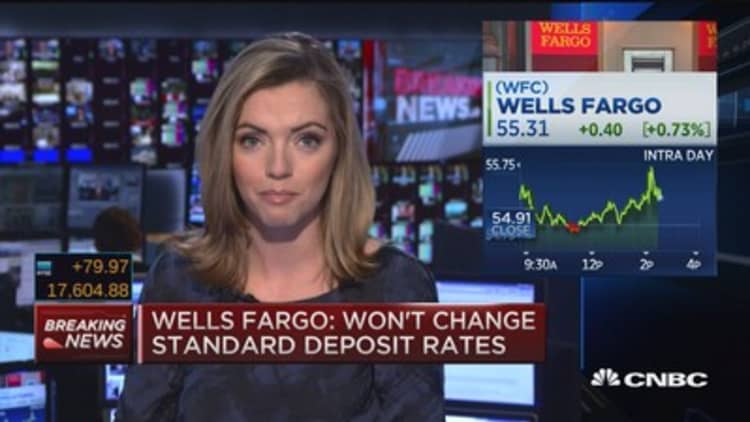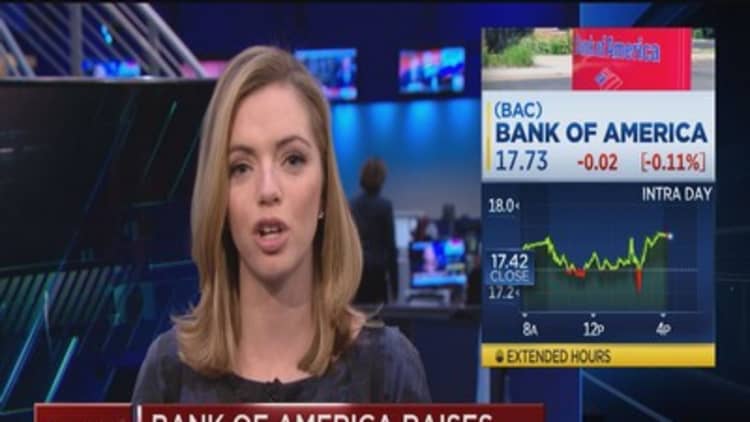


Wells Fargo was the first of a slew of banks in announcing Wednesday that it would increase its prime rate to 3.5 percent effective Thursday.
It was the first major bank to announce a change to the base rate for consumer loans, which has been at 3.25 percent since 2008, according to the Federal Reserve's weekly surveys of the 25 largest banks. Wells Fargo was joined in raising the prime rate by other major banks such as Deutsche Bank, Citibank, U.S. Bancorp, JPMorgan Chase, HSBC, KeyCorp, M&T, BMO Harris Bank, SunTrust, Huntington Bancshares and PNC.
Bank of America and BB&T also raised prime rates to 3.5 percent, effective Wednesday.
This story is developing. Please check back for updates.
The prime rate is the rate at which individual banks lend to their most creditworthy customers, including large corporations. It is often used as a benchmark for other loans like credit card and small-business loans.
The Fed has no direct influence on the prime rate, but it tends to be closely correlated to changes in the target federal funds rate, set by the central bank, which has been unchanged since 2008.
After seven years of the most accommodative monetary policy in U.S. history, the Fed on Wednesday, as was widely expected, approved a quarter-point increase in its target funds rate. The new target will go from 0 percent to 0.25 percent to 0.25 percent to 0.5 percent. Most members expect the new rate to coalesce around 0.375 percent before the next hike, according to a chart showing individual member expectations.
"It is very difficult to raise interest rates because that 25 basis point or that 50 basis point increase makes a substantial difference in terms of financial asset prices and therefore economic growth," Bill Gross, lead portfolio manager of the Janus Global Unconstrained Bond Fund, told CNBC.
The rates that most people pay for mortgages, auto loans or college tuition aren't expected to jump anytime soon, The Associated Press reported. The Fed's benchmark interest rate has limited influence on those things.
A change in the federal funds rate will have no impact on the interest rates on existing fixed-rate mortgages and other fixed-rate consumer loans, a Wells Fargo representative told CNBC.
Still, the Fed's move to lift its key rate by a quarter-percentage point will raise short-term borrowing costs for banks, the AP said. And that, in turn, is intended to prod banks to boost certain other rates. The rates on credit cards and home equity loans and credit lines, for example, will most likely rise, though probably only slightly.
Read MoreWhat a Fed rate hike means for you
"We won't automatically change deposit rates because they aren't tied directly to the prime," a JPMorgan Chase spokesperson told CNBC. "We'll continue to monitor the market to make sure we stay competitive."
— CNBC's Jeff Cox, Kayla Tausche and The Associated Press contributed to this report.
Correction: The target federal funds rate has been unchanged since 2008. An earlier version misstated the year.


